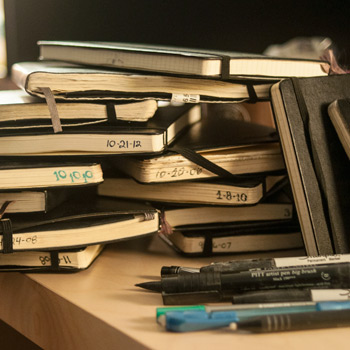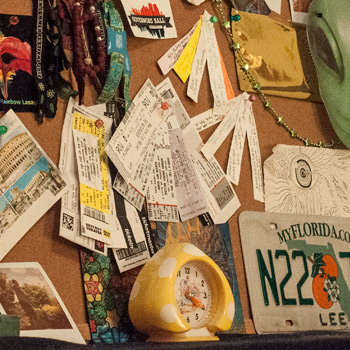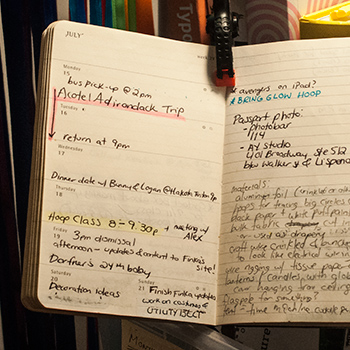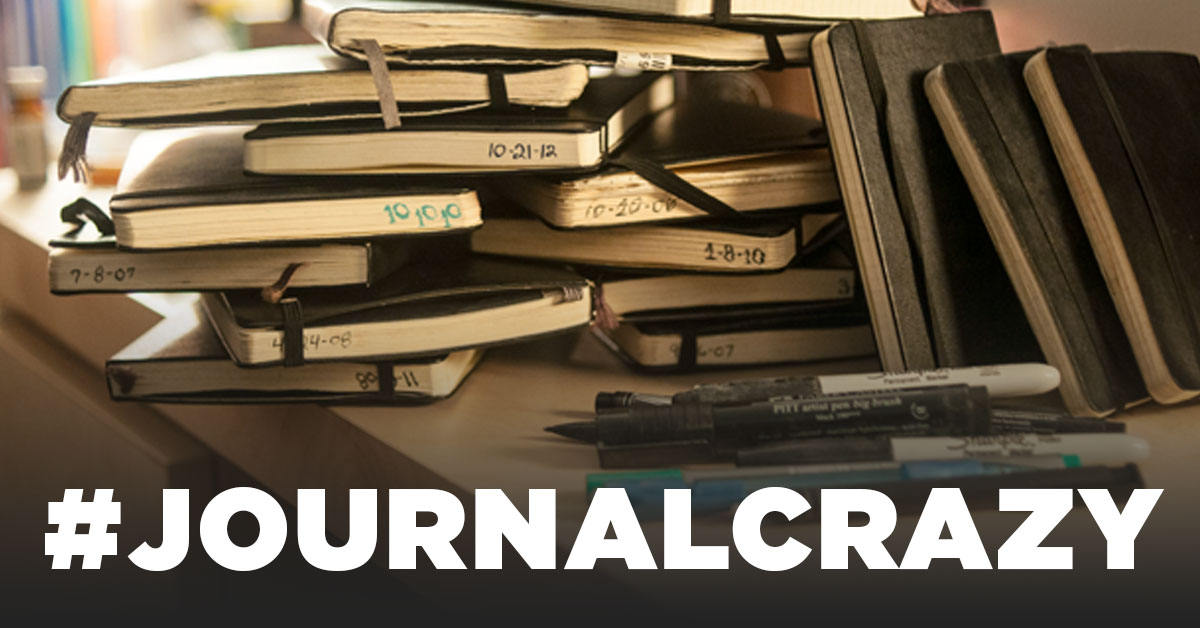 Practicing the lost art of journal keeping
Practicing the lost art of journal keeping
Are you looking to live a more mindful existence? How would you like to prevent the best moments of your life from slipping away into the haze of the past? The simple practice of journal keeping does these things and so much more. It calms the ego and helps you shape your destiny. It allows you to know yourself in new, exciting ways, and to appreciate moments that otherwise might have passed you by. I find journaling to be of even greater importance in today’s behavioral climate, simply by observing how mindless people have become.
We live in a world of distraction.
I mourn the attention our society has lost to mindless activity. The precious attention we waste on games and television each day is something we take for granted. That attention could be used instead for reading – for using our minds to take another’s story and turn it into our own personal journey. Even better, that attention could be put toward journal keeping, because instead of immersing yourself in someone else’s story, you could be creating your own.

Journaling connects you to yourself
Developing a reflective lifestyle can be a serious undertaking for the distracted mind. To widen the definition of “reflective life”, I’ve established four habits – each of which helps to enshrine “the moment” in unique ways. Working together, these practices will help to capture your life from different perspectives, generating a multifaceted record of your past.
#1: Photography
This medium hasn’t faltered at all in the smart phone attention-ocalypse. We chronicle every moment in time (including what we had at that fancy restaurant last week). Our photos record the places we’ve been, the people we’ve met, and the events we’ve attended. Since our phones let us have a camera on us constantly, we find ourselves taking photos of everything all the time. Then let’s not forget to filter that filter until it looks like something that came out of polaroid camera (RIP).

#2: Artifacts
Artifacts consist of found objects, usually small, lightweight, or made out of paper. The Moleskine notebooks I use for my planner and journal have a little folder in the back that I like to keep my wristbands, concert tickets, and other scraps in. These are crucial in constructing a “memory map” corkboard which provides an at-a-glance reminder of all the most beautiful memories from the past. This corkboard sounds like a lot of work but you sort of compile it over time, in no particular order. This helps you to fish these positive memories back up into your conscious mind without having to refer back to your planner or previous journal entries. It’s a physical foundation ready to lift you up on a shitty day and remind you of all the things in your past that have made you smile.

#3: The Oracle
My friend and fellow blogger Nikki calls her weekly planner “the oracle” and the name kind of stuck. This handy little device is the one that goes with you everywhere. You write your plans, your schedule, special dates, phone numbers, you name it. It may seem obviously, but you are documenting your time carefully, and that’s whats most important. I often times reference mine in my journalling as a means of placing one event before another. The oracle reminds you that every day is a blank page with amazing potential.
#4: The Journal
Journal keeping puts a greater focus on your emotions and allows you to remember personal stories for longer periods of time. Documenting any event, whether it be a difficult trauma or an exciting vacation, lets you anchor personality-defining moments and memories firmly in your brain. Recollecting conversations you had with friends or lovers provides you with greater insight into the relationship as a whole. Reflecting on a memory at any point, whether it be immediately afterward or years later, draws that moment back up to the present and gives your brain another excuse to remember it for longer. It prevents the important times in our lives from slipping into the past.
Pain, regret, and moving on
Though you might prefer to forget the most difficult moments, I’ve found that documenting traumatic emotional events can greatly aid in the healing process. Journaling allows you to come to terms with past events, focus on what mattered most out of the situation, and give that memory a concrete place to “live” while you go forth living your life. Often times, writing grants you an opportunity to reestablish forgotten details that you might have overlooked at the time. Have you ever tried smoothing out difficult emotions simply by writing them down? Once you “get it out of your system”, your brain has more room to move around and solve important problems on its own without having to feel cluttered and overworked with anxiety.
Gain perspective when you need it most
When you’re upset, it’s easy to get caught up in hyper-emotional states of egocentric quicksand. Forcing yourself to put these emotions into words will help them seem more manageable and less confusing. Before I have a serious talk with a friend or lover about some drama, I always write about it first, hashing out all the details on my own so that I can better organize my thoughts and present my true feelings in the most logical way possible
Your Own Personal Psychologist
After you’ve kept a journal for an extended period of time, you can start reflecting on past entires. “Personality tracking” is a phrase I use to describe what happens when you read through old entires and start to notice recurring events. Once you establish these habits (which are usually subconscious), you can make a conscious effort to evolve. By moving away from habits that produce negative results, you may gain awareness into your own behavior, forcing mindfulness on a daily basis. You may notice things no one but a sibling or psychologist would have told you otherwise.
Use the past to understand the present
Reconnecting to your past means recognizing what you have let go of and what you have kept as part of you over time. Being mindful of prior emotional states keeps you sharp and focused on your ever-changing self. A journal is like a first-person time capsule ready to take you back to a point in your life cluttered with naivety. “If only you knew then what you know now” has never been truer than when reading old journals. Sometimes it’s amusing, other times it’s just straight up anxiety-inducing.
Some tips from a pro:
1) Free-range words.
Everyone has their own style of journalling, but I love to write in un-lined reporter style notebooks. These give me total freedom in the way I write and the means in which I choose to express myself on any given day. I can write in a spiral if I want, or draw pictures. And don’t forget to make a little folder in the back of your journal for keeping artifacts, if your journal doesn’t come with one already.
2) Solution to the ‘floating hand’
Holding my reporter-style notebook vertically, I write from the top to the crease, then flip it to do the same on the other page. This allows me to write without ever having my hand fall off the bottom of the page. It’s a little wonky to read back but writing comfort is always more important.
3) Color-code your life
I use different colored pens and choose one at random when I sit or lie down to write. The colors usually end up correlating to my mood at the time, or even the content I’m wrting about.
4) Bring a journal with you everywhere…
I have a small moleskine to keep in my purse, and a larger one that is by my bed. Between the two, I always have the option to write when I want to.
5) … but don’t put your habit in a box.
Write when you feel compelled to write. Don’t say to yourself “I’m going to write every night at 11pm!” You WILL let yourself down unnecessarily. The urge to reflect and record will not happen every day, and often times I find myself going weeks or months without writing, just because.
So when do I write?
I write during big vacations and events, mostly to help secure those important memories firmly in my brain, to be reflected up on in vivid detail for the years to come.
I write to sooth weary or grumpy moods, since doing so almost always grants me better perspective and allows me to let go of small petty issues. These times are the hardest to find the motivation, but once I suck it up and just do it, I am always happier in the end.
I write to come to terms with my relationships with people. I went through a not-so-flattering period of about 8 years where I would fall helplessly in love with guys who (obviously) got a little put off by my directness and preferred to just remain friends. I was able to reconcile that behavior by observing the patterns I was making and actively focus my attention on self-improvement.
Last but not least, I write to capture the moment. There are moments that I feel compelled to write about simply because they were so beautiful and fleeting that I knew time would rob me of those subtle details. Hyperbole and a Half‘s Allie Brosh wrote about breaking through depression by finding humor in a sad kernal of corn stuck under her stove. When you keep a journal, there is absolutely nothing too small or petty to write about, simply because you are creating this story for your eyes only. You don’t need to worry about what other people will think – you have complete freedom of expression.
What are you waiting for?!
I’ve put together a few simple easy exercises to dust off the cobwebs and get you thinking in a more reflective way. These are my favorite types of journal writing, and I often jump around between them.
1) List Keeping
This is a unique form of journal keeping that involves breaking down your memories into discrete thoughts and listing them. The order itself doesn’t matter and sentence structure matters even less, so just let it flow. Afterward, if you want to organize these thoughts into something more cohesive, you always have the option.
The Exercise:
Reflect on your last exciting vacation. Who did you meet? What were their characteristics? Where did you stay? How was the food? What were some smells you remember? How about local culture? Who did you go with? Which singular moments stand out the most? Was there music you were listening to a lot while you were away? Would you go back? What could you have done differently?
2) Stream of Consciousness
This is a challenging one and might be best to do on a computer where you can type as quickly as possible. You’ve mostly likely experienced some kind of stream of consciousness prose in past literature (such as James Joyce’s “Portrait of an Artist as a Young Man”). It can get very confusing and tangled, but that’s the point. Let go of your need to form cohesive sentences. Relenquish the need to finish one thought before starting another. This form of journaling harnesses the moment and rides it into oblivion. So just jot down the first thing that comes to your mind, in the order that they bubble to the surfce, and in the end you will have an extremely interesting piece.
The Exercise:
Choose one person that is extremely important to you. Now let the memories, emotions, and sensory experiences flow!
3) The Narrative
Or, your standard journal. The narrative provides your memories with an easy-to-remember home in the world, and it’s your job to explain yourself as completely as possible. Pretend you’re writing your own memoir, only hold NOTHING back. Be creative with the way you describe things, and have at it with the similes, metaphors, and hyperboles.
The Exercise:
Imagine that everything you want in life has happened for you, and you are experiencing a moment which you can only refer to as “your dream come true.” What does this enatil? where do you put yourself? Who are you with? What are some characteristics of your environment besides the location itself? Are you in possession of object or piece of technology? Is there fod involved? Really go deep into this scene as much as you can.
Your journey begins on page 1…
Now go get a simple, portable journal for your own and start writing every chance you get! You will find yourself more connected to your purpose, your passions, and your weaknesses when they spill out onto paper. Let the words flow, keep your mind focused and soon you will begin to accept the practice as a necessary form of expression. I imagine journal writing as a faucet that dumps out all that weighs on my mind, freeing me from excess baggage and opening me up to greater possibilities.
Yours in scribbles,

 Practicing the lost art of journal keeping
Practicing the lost art of journal keeping

